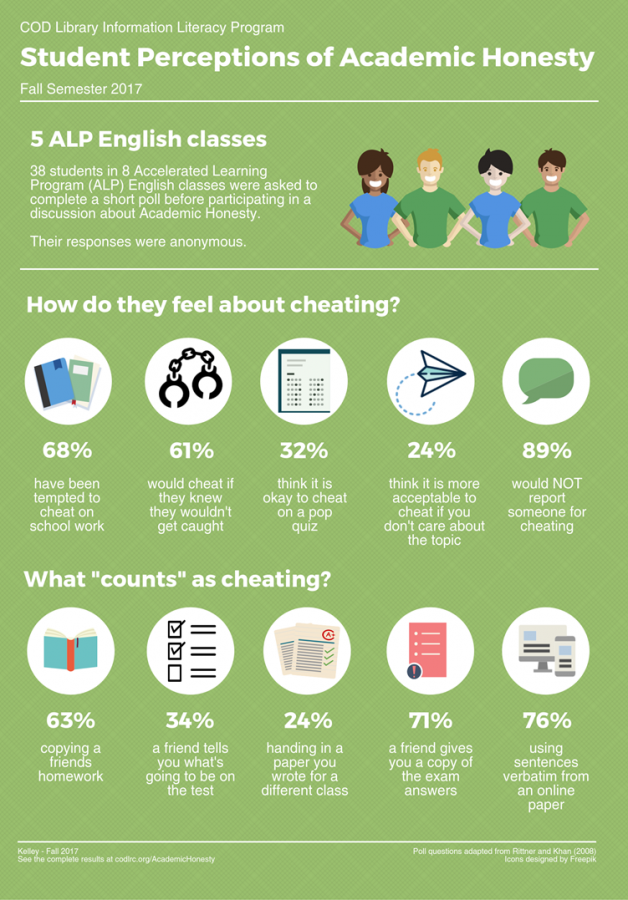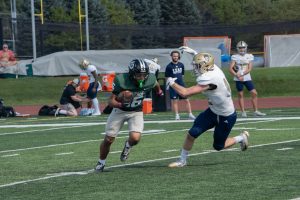“It’s everyone’s responsibility” How academic dishonesty affects college students and institutions
October 26, 2017
• Editors’s note: This story has been updated to remove a misattributed quote
Presented with several common classroom scenarios in a recent survey, a majority of College of DuPage students said academic cheating is OK.
At the College of DuPage, “cheating” is defined as “Copying another’s work, use of unauthorized materials/assistance, such as electronic devices; altering graded work after it’s returned, then submitting it to be re-graded.”
The college handles potential academic dishonesty cases through a number of different ways ranging from learning opportunities to expulsion or community service. There are also the Eight Cardinal Rules For Academic Integrity, which map out your obligations as a student to avoid cheating entirely.
COD subtitles academic honesty with the phrase “It’s everyone’s responsibility” and looks to crack down on an epidemic that has consumed universities nationwide for decades.
Not only did COD host their own academic honesty slogan contest, but has also collected data from students on their views towards the cheating problem.
The COD Library Information Literacy Program asked five Accelerated Learning Program (ALP) English classes–a total of 38 students, to answer a poll regarding academic honesty in Sep. 2017. Results showed 68% of students involved have felt “tempted to cheat on school work” and 61% “would cheat if they knew they wouldn’t get caught”.
Almost a third of those participating answered that they think it is acceptable to cheat on a pop quiz, while almost a quarter reported it acceptable to cheat if the student has no interest in the topic.
Although universities have policies and guidelines, along with teacher syllabi outlining their own personal rules and regulations, students still seem to be on the fence about cheating and what they should get away with.
In the same ALP class study, 63% of students said that copying a friend’s homework “counts” as cheating, but only 24% think that handing in a paper you wrote for a different class falls under the same category.
Coordinator, Specialized Testing Services Jarret Dyer helped kickstart COD’s brand new Academic Integrity Day, which finalized with over 350 students signing COD’s Academic Integrity Pledge.
“For our first one, it went very well.” Dyer said as COD was one of 69 other schools nationwide to participate in the Academic Integrity Day.
Dyer also explained what consequences academic dishonesty can include not only with a student, but an institution as a whole.
“If one student cheats in a particular class, it gives them an unfair advantage. Other students may then decide it is to their best advantage to cheat as well in order to also obtain a favorable outcome on an assignment or test,”
“If this continues, the reputation of the class could be called into question.”
Dyer emphasized the potential of a bigger picture, saying that “Eventually, the institution as a whole can have its reputation devalued if it is known that very little rigor is required to get a certificate or degree from that institution.” And as a result of this drop in standards “it will be the graduates that suffer.”
In the long run, cheating is a stepping stone to a future of always being one step behind. Not only while a student is in school, but his or her career may be at risk as well, Dyer points out.
“If a graduate presents their degree/credential from such an institution that the recruiter believes has little value, the applicant could be placed at a disadvantage compared to other applicants.”
Although a majority of students that participated in the ALP survey counted obvious plagiarism and prior knowledge of test questions as cheating, that doesn’t mean they may not do it.
New software such as SafeAssign has given teachers a basic tool to easily spot plagiarism but the punishments may not fully be understood by a student until they are actually presented.
Dyer concluded his statement by saying, “As the Academic Integrity Implementation Committee continues to raise awareness of the consequences of academic dishonesty throughout this academic year, it is our hope that more students will connect the ramifications of cheating with their individual actions.”




















